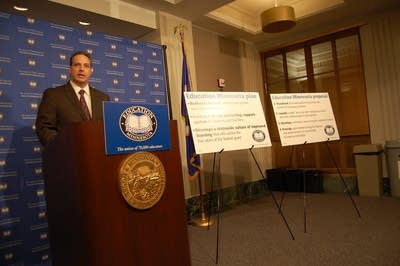Minn. bid for part of education stimulus hits snag
Go Deeper.
Create an account or log in to save stories.
Like this?
Thanks for liking this story! We have added it to a list of your favorite stories.

The state's teachers union complained today that the Pawlenty administration is trying to use federal stimulus dollars to force schools to adopt the governor's merit pay plan.
Education Minnesota says that circumvents the legislative process.
The state is putting the final touches on an application for stimulus money that could bring Minnesota another $200 million. The union's lack of support for the application could weaken the chances of winning the money.
Most federal education stimulus money is automatic and for everyone, divided up based on formulas.
Turn Up Your Support
MPR News helps you turn down the noise and build shared understanding. Turn up your support for this public resource and keep trusted journalism accessible to all.
But one pot of $4.3 billion is competitive. "Race to the Top," as it's called, will award states doing the best job of reforming and improving education. But Education Minnesota president Tom Dooher said the union can't support Minnesota's current application.
"We believe the state's application is focusing on Gov. Pawlenty's programs that he failed to get through legislatively and now is seeing an opportunity to get some of those things put in place to get a federal grant," Dooher said.
One such program is an enhanced version of Q-Comp, a teacher merit pay program. More than 40 districts and 32 charter schools take part in the voluntary program.
Right now, Q-Comp only ties a small portion of merit pay to how well students perform on standardized tests. But with "Race to the Top," the state is promising to increase that portion. If Minnesota wins the money, it will only go to districts that have signed a letter promising to do a number of things, including enhanced Q-Comp.
The union said the application uses money to lure districts into something they otherwise might not have done, adding there are better ways than test scores and Q-Comp to evaluate teachers. The union's lack of support for the application could cost Minnesota points under the system the federal government will use to award money.
The spat lies in defining the word 'reform.' The order from Washington is to reform education and from the state department's perspective Q-Comp does that. For Education Minnesota, it does not.
Department spokesman Bill Walsh said Minnesota has an advantage in this competition because Q-Comp is already in place.
"To start from scratch and not take advantage of the fact that 30 percent of the students in the state are already under a system that the feds are asking for would weaken our application tremendously," Walsh said. "Other states are trying to build it from the bottom up; they're looking at our Q-Comp model as a way to do it.
"[And those states] won't have anybody participating. They'll have to say 'we're going to get people to participate.' We're going to say 'we already have 30 percent of the students in it, we're going to enhance it and get more,'" Walsh said.
Education Minnesota presented ideas Wednesday to include in the application - but the timeline is tight. Applications are due January 19. One quirk is that lawmakers don't go back into session until February - leaving them mostly out of the process of applying for the money.



